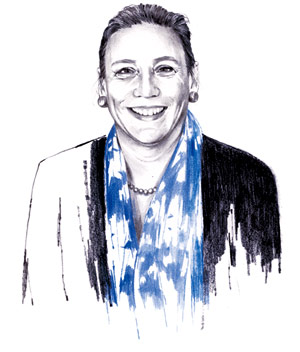
One beautiful summer night, I was walking my two Great Pyrenees, Padma and Suka, near the golf course when I met two students from the Language Schools who were speaking Japanese.
When they saw me, they greeted me in English. Because I am an administrator, that was appropriate. The Language Pledge doesn’t apply when talking to members of the administration.
When they went to hug and pet my dogs, however, I reminded them to love my dogs in Japanese, not English. And so they did—switching immediately. Padma and Suka were, of course, delighted to be loved in any language. Their happy wags let the students know they were fully understood.
That experience stayed with me, first because it’s a quintessential Middlebury tale about how two American students, speaking Japanese in Vermont, switched to English to talk to me but then easily went back to Japanese to speak to my dogs. It’s also a story about how dogs can be a powerful facilitator of social, and even intellectual, life. The dogs helped those students be in a space with me that would not have existed had I been walking alone.
Dogs don’t judge. In fact, they can enable open, emotional communication, and also inspire a certain kind of joy. My brother and niece are involved in a library program where kids practice reading while dogs listen to them. These programs have been shown to improve reading skills and interest. When I was learning to chant Hebrew at age 40, I did the same!
I’ve always had at least one dog. I find dogs make wonderful company and are central to my everyday life. I am not alone in this view—where there are humans, there are dogs, from tropical forests to the Arctic Circle. Research reveals how dogs’ rich understanding of the world makes them not only remarkably well- suited companions, but also flexible problem solvers with deductive skills similar to those of young children. From an evolutionary scientist’s perspective, dogs and humans literally created each other—forming each other’s temperaments and habits, helping each other hunt, eat, and solve the problems of living.
Flexible problem solvers—that’s what we want Middlebury students to be. Middlebury can be intense—upbeat, and curious, and focused, yes, but also intense. A few years ago, after much consultation, we changed Middlebury policy to become more dog friendly, allowing faculty and staff in many areas of campus (not all) to bring their dogs to work. We did so to promote the kind of curiosity, joy, and compassion toward one another that dogs inspire.
I see how we are reaping the benefits of canine colleagues. Whether they’re being pet students during finals, or walking across campus, greeting passersby with pleasure; or taking a nap on an office floor while student and professor discuss a thesis, it’s clear that the presence of dogs can make it easier for humans to connect.
Dogs also teach us discernment: learning our limitations and inspiring us to meet challenges. When I was growing up, Charlie the golden retriever was part of our family. He was a wonderful dog with a wonderful enthusiasm for what might be possible. When he could, he chased trucks with abandon. Mostly, he focused on trees. Yes, trees. When he wanted us to throw something, he wouldn’t bring just a stick or branch. He would find a small fallen tree, drag it to the porch, and wait for us to throw it.
Often we broke it down into sticks that we could actually throw. But some of the time, we’d just say, “Too big, Charlie!” when we knew, despite his excitement, what Charlie was asking for was just not physically achievable.
That phrase, “Too big, Charlie!” (otherwise known as “TBC”), became shorthand for what to say when you’re asked to do the impossible. It’s a phrase I introduced here at Middlebury when there was just too much for one person or team to accomplish. TBC is a familiar acronym around Old Chapel.
But there’s also a flip side of TBC: Epic Fetch. The Internet meme shows a dog carrying a branch in its mouth that’s attached to an entire tree trunk. Epic Fetch is the way that so often at Middlebury, a seemingly impossible task becomes possible given the right circumstances and the right determination.
Those Language Schools students were engaged in an Epic Fetch, committing to live for a time in a language not their own. The expert analysis our MIIS faculty and colleagues at the Center for Nonproliferation Studies have provided in the wake of the Iranian missile strike in January? The launch of a School of Abenaki pilot program with the Language Schools, helping to expand understanding of this endangered Eastern Algonquin language? The new class of Febs?
You are part of the Middlebury community, and the Epic Fetches that have built us and sustain us, whether or not you are a dog person. (And even if you are not, Padma and Suka will still love you, in any language.)

Leave a Reply